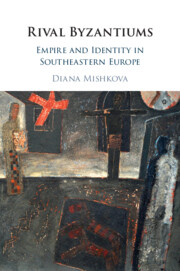Book contents
- Rival Byzantiums
- Rival Byzantiums
- Copyright page
- Contents
- Acknowledgements
- Note on the Text
- Additional material
- Introduction
- Part I On the Road to the Grand Narrative
- Chapter 1 Precursors
- Chapter 2 The Century of History
- Chapter 3 In Search of the ‘Scientific Method’
- Chapter 4 Between Byzantine Studies and Metahistory
- Chapter 5 Byzantium in Ottoman and Early Republican Turkish Historiography
- Part II Metamorphoses of Byzantium after World War II
- References
- Index
Chapter 4 - Between Byzantine Studies and Metahistory
from Part I - On the Road to the Grand Narrative
Published online by Cambridge University Press: 01 December 2022
- Rival Byzantiums
- Rival Byzantiums
- Copyright page
- Contents
- Acknowledgements
- Note on the Text
- Additional material
- Introduction
- Part I On the Road to the Grand Narrative
- Chapter 1 Precursors
- Chapter 2 The Century of History
- Chapter 3 In Search of the ‘Scientific Method’
- Chapter 4 Between Byzantine Studies and Metahistory
- Chapter 5 Byzantium in Ottoman and Early Republican Turkish Historiography
- Part II Metamorphoses of Byzantium after World War II
- References
- Index
Summary
The interwar period was marked by a wide gamut of interpretations of Byzantium, which involved a growing number of disciplines, different interpretative strategies and methods (from rigorously factographic to metahistorical) and competing political agendas and ideological orientations – national, quasi-imperial (or multinational) and regionalist. Byzantine studies became firmly embedded in the academic systems in the region, yet even those trained in this field were busy bringing their expertise to bear on the current debates about collective identity and state formation rather than cultivating knowledge of Byzantium. The resultant confrontation between the different historical narrations fed on a set of shared assumptions and ideological concepts, which underwrote the fragmentation of history into national compartments. The positive appropriation of Byzantium was reserved for those of its achievements or imprints that could be effectively nationalised or made to serve a national cause. The only remarkable exception was the supra-national agenda of the budding ‘science of balkanology’, but its theoretical and programmatic acumen was not matched by actual historical research.
Keywords
- Type
- Chapter
- Information
- Rival ByzantiumsEmpire and Identity in Southeastern Europe, pp. 123 - 169Publisher: Cambridge University PressPrint publication year: 2022



